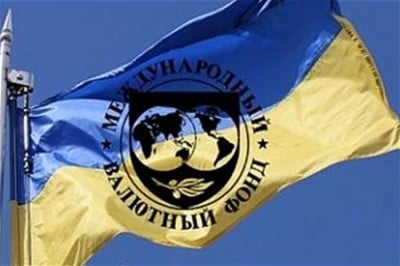Ukraine, IMF “Shock Treatment” and Economic Warfare

The media’s game of mirrors has been projecting deceitful images of the Ukrainian crisis, such as those of corporations and US and European banks who see their investments in Ukraine go up in smoke and are about to abandon ship before it sinks.
Just when they are about to obtain what they are after: the complete control of the Ukrainian economy.
The rescue rope thrown to Kiev by the IMF and the European Union is in reality a ball and chain. Ukraine’s external debt, as documented by the World Bank, increased tenfold in ten years and exceeds 135 billion dollars. In interests alone, Ukraine must pay about 4.5 billion dollars a year. The new loans will only serve to increase the external debt thus obliging Kiev to “liberalize” its economy even more, by selling to corporations what remains to be privatized.
The conditions attached to the loans are dictated by the IMF, controlled by the United States with 17,5% of the vote (seven times more than Russia) and by other major western powers, while a state like Ukraine is only entitled to half a vote.
It is to a situation like this – through the responsibility of its successive governments since 1991 – that Ukraine has been reduced, while still possessing a significant industrial and agricultural base, and having concluded in 2009 with Moscow a favorable ten-year agreement on the transit rights of Russian energy supplies to Europe.
Ukraine’s condition is due at the same time to western penetration in its political and economic fabric. Just for the promotion of “good governance” in Ukraine, Assistant Secretary of State Victoria Nuland disclosed that the United States had invested more than 5 billion dollars. An investment that allowed Nuland, in a leaked telephone conversation, to order who must and must not be part of the new government and to tell the EU to “go f… itself.” An expression, which in spite of Nuland’s apologies shows the true colors of Washington’s politics towards Europe.
The Obama administration, writes the New York Times, pursues “an aggressive strategy” aiming to reduce Russia’s gas supplies to Europe, the major importers being Germany and Ukraine (Italy ranks fifth). It is envisaged that ExxonMobil and other US companies will supply growing quantities of gas to Europe by exploiting reserves in the Middle East, Africa and other regions, including the US where production has increased.
Major companies have already submitted to the US Energy Department 21 requests to build harbor installations for exporting liquid gas. The plan also calls for strong pressure to be put on Gazprom, the largest Russian company of which the State controls the majority of shares, but which is open to foreign investments. It is listed on the London, Berlin and Paris Stock Exchanges, and according to JP Morgan, half of its foreign stockholders are from the United States.
Washington’s strategy pursues a double goal: on one hand to put Ukraine in the hands of the US-dominated IMF and annex it to NATO, also under US control; on the other hand to use the Ukrainian crisis, which Washington contributed to create, to reinforce US influence over its European allies. To this end, Washington is coming to an agreement with Berlin on a partition of areas of influences.
All this while Matteo Renzi (new Prime Minister of Italy), dusting off an elementary school book, declaims that “one cannot be insensitive to the cry of pain of the Ukrainian people.”
Article in italian : http://ilmanifesto.it/ucraina-le-armi-delleconomia/
Translation : voltairenet.org

